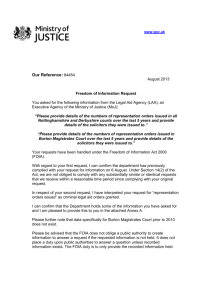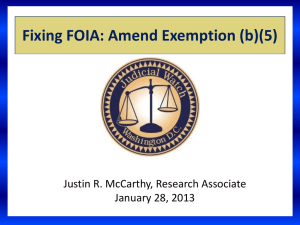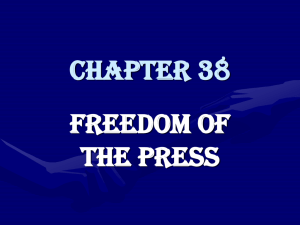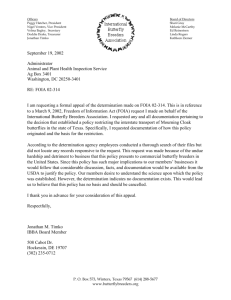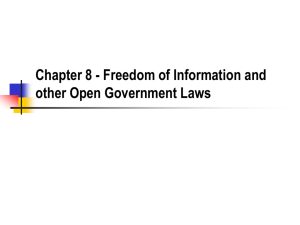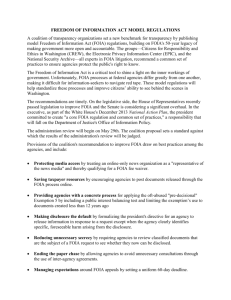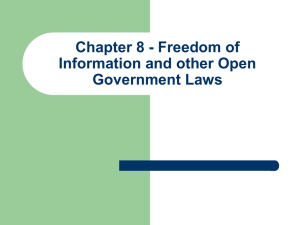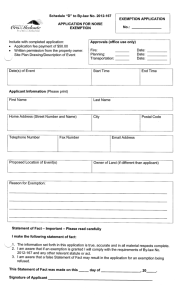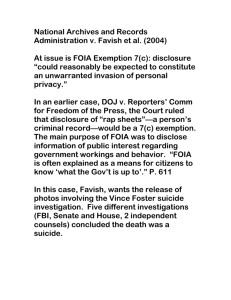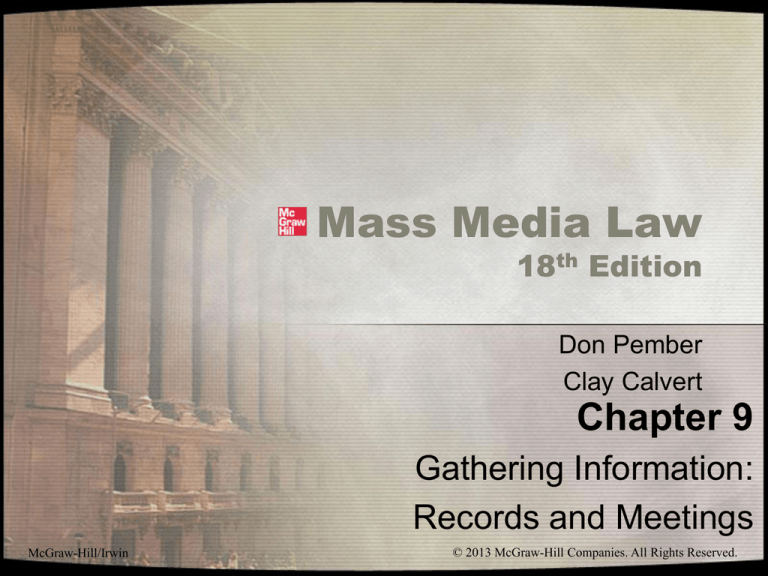
Mass Media Law
18th Edition
Don Pember
Clay Calvert
Chapter 9
Gathering Information:
Records and Meetings
McGraw-Hill/Irwin
© 2013 McGraw-Hill Companies. All Rights Reserved.
News Gathering & the Law
There are three primary sources of law to which
journalists might look for a legal right to access
information:
– Common law
– Constitutional law
– Statutory law
9-2
News Gathering & the Law
Common law
– Only provides bare access to government documents
and meetings of public agencies
9-3
News Gathering & the Law
Constitutional law
– Historically, the First Amendment was seen as a
means by which the public could confront its
government, not necessarily report on its activities.
– The Supreme Court has found no unrestrained right
of journalists to gather information beyond that of the
average citizen.
9-4
News Gathering & the Law
Constitutional law
– In three cases involving prisons, the Supreme Court
found the First Amendment does not guarantee a
journalist the unobstructed right to gather news in
such a setting.
– The Court has ruled that there is a First Amendment
right for all citizens to attend a criminal trial.
9-5
News Gathering & the Law
Constitutional law: Access to Government Officials
– Members of the press have no special right of access
to government officials to conduct one-on-one private
interviews.
– Recent cases suggest that government officials
cannot selectively deny access to specific reporters
from public press conferences that are open to all
members of the news media.
9-6
The First Amendment
Protection of News Gathering
Journalists today are being sued not just for how
they report the news, but increasingly for how they
gather the news:
– Trespass
– Harassment
– Fraud
– Failure to obey lawful orders
– Taping and recording
9-7
The First Amendment
Protection of News Gathering
Trespass: Definition
– Trespass is an intentional, unauthorized entry onto
land that is occupied or possessed by another.
– Reporters may face civil liability and criminal
prosecution when they trespass.
9-8
The First Amendment
Protection of News Gathering
Trespass: Defenses
– Consent may be a defense when journalists are
invited or allowed onto private property.
– When property is generally open to the public
(businesses), and journalists do not otherwise
interfere with the business use.
9-9
The First Amendment
Protection of News Gathering
Trespass: Ride Alongs
– Government agents (police, firefighters)
cannot give permission to reporters or
photographers to enter private property.
– Government agents and the journalists can be
held accountable for trespass or violations of
the Fourth Amendment – illegal search and
seizure.
9-10
The First Amendment
Protection of News Gathering
Harassment
– Journalists who hound, stalk, or undertake other
unreasonable surveillance methods may be charged
with harassment.
9-11
The First Amendment
Protection of News Gathering
Fraud
– Fraud is a knowingly false statement of a material or
significant fact that is communicated with the intent to
induce the plaintiff to rely on that statement and that
does, in fact, induce the plaintiff to reasonably rely
upon it to the plaintiff’s harm or injury.
– Journalists cannot lie to gain access to otherwise
private property or information.
9-12
The First Amendment
Protection of News Gathering
Failure to obey lawful orders
– Reporters must respect orders from police and fire
officials at the scene of disasters, accidents and fires
or face disorderly conduct or other criminal charges
9-13
The First Amendment
Protection of News Gathering
Taping and recording
– In some states, the secret recording of conversations
can lead to prosecution.
– Nearly half of all states and the federal government
have laws against eavesdropping.
– One-party consent states allow secret recording of
conversations. All-party consent states require
reporters to obtain permission from all parties before
recording.
9-14
The Freedom of Information Act
FOIA: Overview
– The Freedom of Information Act (FOIA) provides a
statutory right of access to records possessed by
federal government agencies.
– This is a critical tool for journalists.
9-15
The Freedom of Information Act
FOIA: Applying the Law
– The federal government has often been hostile to
FOIA requests made by reporters.
– The Bush Administration, especially following 9-11,
has been highly restrictive in its release of information
to the public via FOIA requests.
– After 9/11, the nation’s record-keepers have followed
the “when in doubt, don’t let it out” approach.
9-16
The Freedom of Information Act
FOIA: Electronic Communication
– In 1996, Congress adopted an amendment to the
FOIA, known as e-FOIA, that requires government
agencies to apply the same standards of disclosure to
electronic records that they have always applied to
paper documents.
– The law does not define “electronic information,”
leaving this important question to federal agencies
and the courts.
9-17
The Freedom of Information Act
FOIA: Agency Records
– An agency is defined as any executive department,
military department, government corporation,
government-controlled corporation or other
establishment in the executive branch of government,
or any independent regulatory agency
9-18
The Freedom of Information Act
FOIA: Agency Records
– Though physical characteristics were not specified in
the Freedom of Information Act, records include:
•
•
•
•
•
•
Paper documents
E-mail
Computer-generated materials
Films
Tapes
Three-dimensional objects, such as evidence
9-19
The Freedom of Information Act
FOIA: Agency Records
–
Courts define “agency record” as:
1. If record is created or obtained by an agency, and
under agency control at the time of the FOIA
request, it is very likely an agency-record.
2. If the agency has created the document but does not
possess or control it, it is not an agency record.
3. If the agency merely possess the document, but has
not created it, it might or might not be an agency
record.
9-20
The Freedom of Information Act
FOIA: Exemptions
– The FOIA has nine specific statutory exemptions and
is limited by recent laws, such as the Homeland
Security of Act of 2002, that create specific
exceptions from FOIA requirements.
9-21
The Freedom of Information Act
FOIA: Nine Exemptions
1. National security matters
2. Housekeeping materials
3. Material exempted by statute
4. Trade secrets
5. Working papers and lawyer-client privileged
documents
9-22
The Freedom of Information Act
FOIA: Nine Exemptions
6. Personal privacy files
7. Law enforcement records
8. Financial institution materials
9. Geological data
9-23
The Freedom of Information Act
National Security (Exemption 1)
– Exemption 1 covers matters specifically authorized
under criteria established by an executive order to be
kept secret in the interest of national defense or
foreign policy.
9-24
The Freedom of Information Act
National Security (Exemption 1)
•
Courts rule in favor of the government on
Exemption 1 if an agency’s affidavits:
1. Describe justifications for nondisclosure in
reasonably specific detail,
2. Demonstrate the information withheld logically falls
within the claimed exemption, and
3. Are not contradicted by evidence in the record or
by evidence of agency bad faith.
9-25
The Freedom of Information Act
Homeland Security Act Exemptions
– Created in response to September 11, 2001.
– “Critical infrastructure information” voluntarily
submitted to the Homeland Security Department by
private persons and business entities.
– Grants companies immunity for civil and criminal
liability relating to any information that they voluntarily
submit.
9-26
The Freedom of Information Act
Housekeeping Practices (Exemption 2)
– Protects from disclosure material that is “related solely
to the internal personnel rules and practices of an
agency.
9-27
The Freedom of Information Act
Statutory Exemption (Exemption 3)
– Covers matters specifically exempted from disclosure
by statute. Courts typically ask three questions when
evaluating applicability of this exemption:
1. Is there a specific statute that authorizes or
requires the withholding of information?
2. Does the statute outline specific criteria for
information that may be withheld?
3. Does the record or information that is sought fall
within the categories of information that may be
withheld?
9-28
The Freedom of Information Act
Statutory Exemption (Exemption 3)
– The CIA has managed to use this exemption to almost
completely shield its operations from public scrutiny.
9-29
The Freedom of Information Act
Trade Secrets (Exemption 4)
– This exemption covers trade secrets and financial or
commercial information.
– Only applies if a 3-part test is satisfied:
1. The information for which the exemption is sought
must be a trade secret or commercial or financial
in character
2. It must be obtained from a person
3. It must be privileged or confidential
9-30
The Freedom of Information Act
Working Papers / Discovery (Exemption 5)
– This exemption shields working papers such as
studies, reports, and memoranda that are prepared to
assist decision-makers in developing policy.
– The exemption also protects communications between
an agency and its attorney.
– The documents typically must be pre-decisional and
deliberative.
9-31
The Freedom of Information Act
Personal Privacy (Exemption 6)
– This exemption shields “personnel and medical files
and similar files.”
– “Similar files” are those that contain highly personal
information of the same magnitude as that contained in
personnel or medical records.
9-32
The Freedom of Information Act
Law Enforcement (Exemption 7)
– This exemption covers records compiled for law
enforcement purposes, whose disclosure would:
a.
b.
c.
d.
e.
f.
Interfere with enforcement proceedings,
Deprive a person of a right to fair trial,
Constitute an unwarranted invasion of personal privacy,
Disclose the identity of confidential sources,
Disclose law-enforcement techniques that might risk
circumvention of the law, or
Endanger the life or physical safety of any individual.
9-33
The Freedom of Information Act
Financial and Geological Data (Exemptions 8 / 9)
– Exemption 8 protects financial reports or audits whose
public disclosure would undermine public confidence in
financial institutions.
– Exemption 9 prevents speculators and other drillers
from gaining access to valuable information about oil
wells.
9-34
The Freedom of Information Act
Handling FOIA Requests
– Government departments must answer requests for
records and documents within 20 business days.
– If an appeal is filed after a denial, the agency has only
20 days to rule on the appeal.
9-35
The Freedom of Information Act
Handling FOIA Requests
–
Fees for FOIA requests are based on the kind of
requester:
1. Commercial-use requesters must pay fees for document
search, duplication and review.
2. Non-commercial requesters from educational or scientific
institutions pay no search fees and receive one hundred
pages of free duplication.
3. Representatives of the news media pay no search fees and
receive copies of one hundred pages free.
4. All other requesters receive two hours of search time and
one hundred pages at no charge.
9-36
The Freedom of Information Act
FOIA Online Resources
– Five excellent on-line resources to consult for further
information:
•
•
•
•
•
•
The FOIA Project
National Security Archive (George Washington University)
Freedom of Information Center (University of Missouri)
Reporters Committee for Freedom of the Press FOIA Guide
US Department of Justice, FOIA Information Center
Federal Communications Commission (FCC) FOIA Center
9-37
The Freedom of Information Act
Federal Open-Meetings Law
– Government in Sunshine Act, 1976
• Applies to 50 federal bodies.
• Courts have interpreted this law to apply only to
those bodies appointed by the President.
• There are 10 exemptions to the Act that allow for
closed meetings; the 9 FOIA exemptions plus an
arbitration exemption.
9-38
State Law on Meetings and
Records
State Open-Meetings Laws
– All 50 states have specific statutes that mandate open
meetings. Most open-meetings laws:
• Provide for closed meetings, or executive
sessions, in certain kinds of cases, and
• Require advance public notice of regular and
special meetings.
9-39
State Law on Meetings and
Records
State Open-Records Laws
– Every state has some kind of open-records law. Most
state laws permit inspection of records by any person;
some allow inspection only by citizens of that state.
9-40
State Law on Meetings and
Records
State Open-Records Laws: Common Exemptions
–
Six common exemptions to state open-records laws
are:
1. Information classified as confidential by state or federal law
2. Law enforcement and investigatory information
3. Trade secrets and commercial information
4. Preliminary departmental memorandums (working papers)
5. Personal privacy information
6. Information relating to litigation against a public body
9-41
State Law on Meetings and
Records
The Privatization of Public Government
– For-profit and non-profit organizations are now
operating state facilities such as schools, prisons and
welfare agencies. These private organizations do not
have the same legal obligations to provide access to
meetings and records.
9-42
Laws that Restrict Access
to Information
School Records: The Buckley Amendment
– The Family Educational Rights and Privacy Act
(sometimes called the Buckley Amendment) permits
parents to review their children’s educational records.
– The act also prohibits the dissemination of personally
identifiable information, excluding directory data, to
unauthorized persons without the consent of parents
9-43
Laws that Restrict Access
to Information
Health and Medical Records: HIPAA
• Limits the ability of journalists to obtain information
about patients in hospitals and other healthcare
settings.
• Journalists can obtain information about crime victims
from law enforcement sources without violating this
law as HIPPA applies only to healthcare and health
insurance providers.
9-44
Laws that Restrict Access
to Information
The Federal Privacy Law
–
The Privacy Act of 1974 attempts to check the
misuse of personal data obtained by the federal
government. It also provides access for individuals
to records about themselves that are held by federal
agencies.
–
Each federal agency must limit the collection of
information to that which is relevant and necessary,
comes directly from the subject concerned, and
allows individuals to review and amend their
personal records.
9-45
Laws that Restrict Access
to Information
Criminal History Privacy Laws
– Press access to criminal history records kept by the
police has been virtually eliminated unless:
• Data sought are pertinent to an incident for which a
person is currently being processed by the criminal
justice system,
• They are conviction records, or
• They are accessible only on that basis.
9-46
Laws that Restrict Access
to Information
State Statutes that Limit Access to Information
– All states have statutes that limit access to
information that would otherwise be available under a
freedom of information law.
– All the states and the federal government have laws
that specifically exclude certain kinds of information
from public scrutiny
9-47

